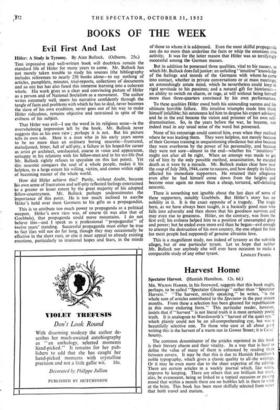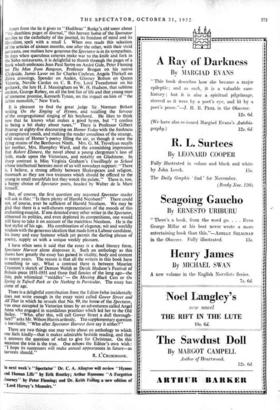Harvest Home
Spectator Harvest. (Hamish Hamilton. 12s. 6d.) MR. WILSON HARRIS, in his foreword, suggests that this book ought, perhaps, to be called "Spectator Gleanings" rather than "Spectator Harvest." "The harvest, strictly speaking," he writes, is the whole sum of articles contributed to the Spectator in the past sixteen months. From these a selection has been gleaned for republication in this more enduring form." This particular reader, however, insists that if "harvest" is not literal truth it is most certainly poetic truth. It is analogous to Wordsworth's "harvest of the quiet eye," which plainly could not be an all-comprehending eye, but was a beautifully selective one. To those who care at all about good writing this is the harvest of a warm sun in Gower Street; it is Ceres' bounty.
The common denominator of the articles reprinted in this book is their literary charm and their vitality. In a way that is hard to define the value of many of them is enhanced by reading them between covers. It may be that this is due to Hamish Hamilton's noble typography, which gives a classic quality to all.the writings. Or it may be even more due to the sheer expertise of the editing. There are certain articles in a weekly journal which, like wines, improve by keeping. There are others that are brilliant but must, alas, be evanescent, being so linked to a topical occasion or passing mood that within a month there are no bubbles left in them to wink at the brim. This book has been most skilfully selected from wines that both travel and mature. Apart from the lie it gives to "Hudibras" Butler's old sneer about "the deathless pages of diurnal," this harvest home of the Spectator testifies to the catholicity of the journal, its freedom of mind and its liberalism, spelt with a small L When one reads this selection of the articles of sixteen months, one after the other, with their vivid contrasts, one realises how generous the Spectator is in its sympathies. In days when querulous coteries make war to the .knife and fork in the Soho restaurants, it is delightful to thumb through the pages of a book which embraces Jean Paul Sartre on Andre Gide, Peter Fleming on The Man from Rangoon, Professor Brogan on his native Clydeside, James Laver on Sir Charles Cochran, Angela Thirkell on Zebra crossings, Spender on Auden, Glorney Bolton on Queen Victoria, Neville Cardus on C. B. Fry, Lord Tweedsmuii on his goshawk, the late H. J. Massingham on W. H. Hudson, that sublime ancient, George Robey, on all the.lost fun of life and that young man of immense promise, Kenneth Tynan, on the impact on him of "the cubist monolith," New York.
It is pleasant to find the great judge Sir, Norman Birkett writing On the Singing of Hymns, and recalling the fervour of the congregational singing of his boyhood. He likes to think now that he knows what makes a good hymn, but "I confess to being a bit shaky about tunes." There is Professor Gilbert Murray at eighty-five discoursing on Homer Today with the freshness of enraptured youth, and making the reader conSdous of the strange, wild music of Homer's poetry filling the air, as though it were the dying strains of the Beethoven Ninth. Mrs. G. M. Trevelyan recalls her mother, Mrs. Humphry Ward, and the astonishing impression that Robert Elsmere, the novel about a young clergyman's loss of faith, made upon the Victorians, and notably on Gladstone. In sharp contrast is Miss Virginia Graham's Unwillingly to School whose intellectual heresies most of us will nowadays support: "There is, I believe, a strong affinity between Shakespeare and religion, inasmuch as they are two treasures which should be offered to the young in small mouthfuls lest they wreck the palate." There is, too, a happy choice of Spectator poets, headed by Walter de la Mare himself.
But, of course, the first question any seasoned Spectator reader will ask is this: "Is there plenty of Harold Nicolson?" There could not, of course, ever be sufficient of Harold Nicolson. We may be glad that there is a well-chosen representation of the moods of this enchanting essayist. If one detested every other writer in the Spectator, abhorred its politics, and even deplored its competitions, one would still have to take it on account of the matchless Nicolson. He is the best stylist of his age. His combination of elegance, wit and worldly wisdom with the generous idealism that made him a Labour candidate, his irony and easy humour which yet permit the darting phrase of poetry, supply us with a unique weekly pleasure.
1 have often seen it said that the essay is a dead literary form. Spectator Harvest alone disproves it. Such an anthology as this shows how greatly the essay has gained in vitality, body and content in recent years. The reason is that all the writers in this book have something to say. What a contrast there is between Maurice Cranston's sketch of Denton Welch or Derek Hudson's Festival of Britain piece 1851-1951 and those frail fancies of the long ago--the thin, pale whimsical "middles"— On Meeting Black Cats or On Spring in Tufnell Park or On Nothing in Particular. The essay has come of age.
There is a delightful contribution from the Editor (who incidentally does not write enough in the essay vein) called Gower Street and All That in which he reveals that No. 99, the home of the Spectator, was once occupied in Victorian times by an adventuress called Angel Anna who engaged in scandalous practices which led her to the Old Bailey. "Who, after this, will call Gower Street a dull thorough- fare?" asks Mr. Wilson Harris artlessly. The supplementary question is inevitable,'"Who after Spectator Harvest dare say it either?"
There are two things one may write about an anthology to which one feels kindly--that it makes admirable bedside reading, and that it answers the question of what to give for Christmas. On this occasion the trite is the true. One echoes the Editor's own wish : "I hope its successors will make annual appearances in future—as harvests should." R. J. CRUIKSHANK.



































 Previous page
Previous page